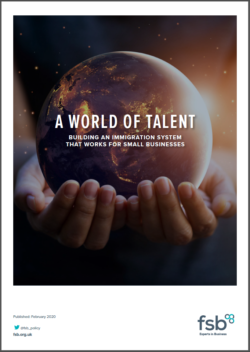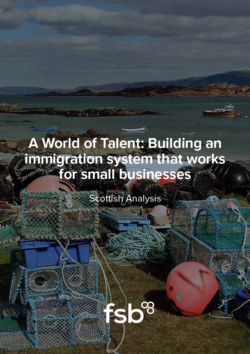Foreword
Challenges can be overcome and small businesses are willing and ready to play their part, but they need time to adjust. The skills story of the next decade will be one of hard worked for evolution rather than an overnight revolution. Significant Government funding will be needed if the UK’s skill system is to develop sufficiently for the UK to be a global competitive force in the era of the Fourth Industrial Revolution. However, this will take time and small businesses must not face a sharp decline in the availability of international workers at the end of the transition period. This is why in addition to the changes to Tier 2 (General) and the Global Talent visa we must also see the introduction of a temporary unsponsored route that allows workers at all skills levels to come to the UK for a period of two years to work before leaving the UK. The route should also allow for in-country switching.
We must also not forget about the self-employed. The self-employed – now one in seven of the workforce – provide dynamism and flexibility to the UK labour market. The talents and entrepreneurial ability of migrant self-employed contractors and entrepreneurs should not be left out of the conversation on immigration. Applying a points-based system to the Global Talent visa, if designed correctly, could do much to ensure the UK is wide open to talented international freelancers. In addition, a well-designed Innovator visa which includes the right checks and balances will ensure the UK can attract the best entrepreneurs who want to start and grow their businesses in the UK.
This is the dawn of a new era; small businesses are key to the UK’s future economic success and prosperity. To achieve this aim we need sensible, collaborative policy making, realistic time frames, cost reductions, and less bureaucracy, in an immigration system built on a pro-small business approach.
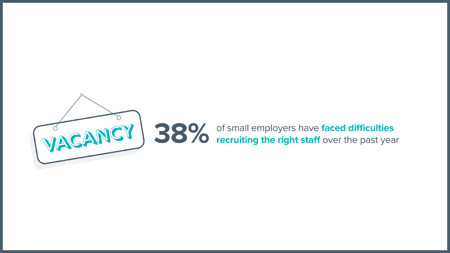
Small businesses faced difficulties recruiting the right staff
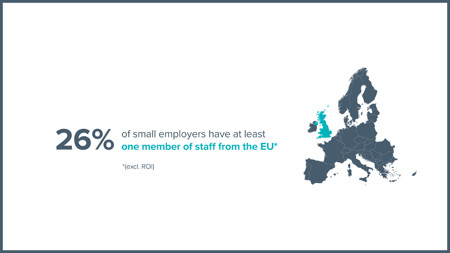
26% of small employers have at least one member of staff from the EU (excl. ROI)
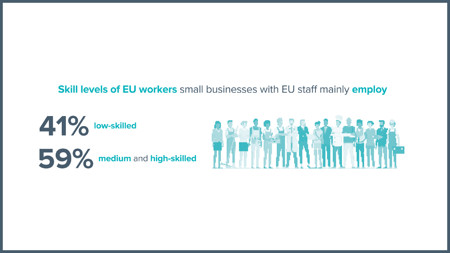
Skill levels of EU workers
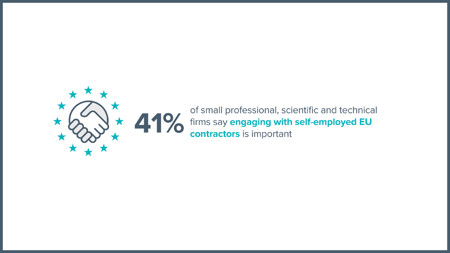
Engaging with self-employed EU contractors is important
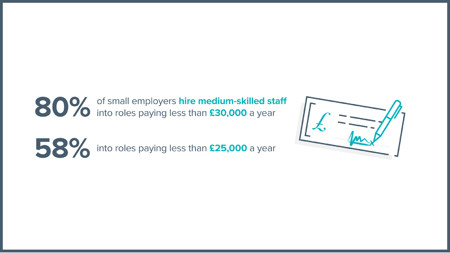
Pay
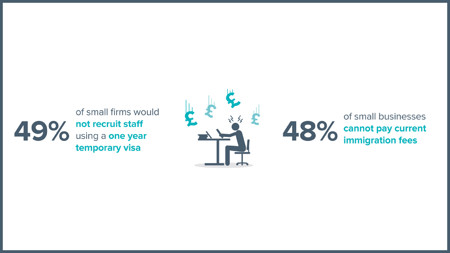
Visa
Executive summary
Implementing a fair and flexible immigration system is vital for many of the UK’s 5.8 million small businesses. Many small firms rely on talent from outside the UK to plug current skills gaps, grow their businesses and contribute to the wider economy. The challenge now for Government is to build an employer-responsive immigration system before December 2020. The only clear path to achieving this is if the Government chooses to work with the UK business community. In partnership, we can deliver a fair and flexible immigration system that will meet the future needs of all small businesses in the UK.
This report is based on quantitative and qualitative data collated from FSB members. It is structured into eight chapters: small business use of non-UK labour; skills challenges and immigration policy; including skill levels and salary levels; the impact of the Government’s skill and salary level policy on small firms; international comparisons and a new PBS to support small businesses; the temporary route and low-skilled migration; immigration in Wales, Scotland, and Northern Ireland; the sponsorship system and costs; and immigration policies for the self-employed.
Small business use of non UK labour
FSB research found that 26 per cent of small business employers employ European Economic Area (EEA) workers excluding those from the Republic of Ireland (RoI). There are marked regional variations in the employment of EEA workers across the UK, with businesses in London (53%), Scotland (40%) and the South East (31%) employing high numbers of EEA workers.
Medium and high-skilled occupations
FSB’s evidence shows 46 per cent of small businesses employ at least one high-skilled British worker, in contrast to 55 per cent of small businesses with EEA staff that employ at least one high-skilled worker. Small firms want access to the best talent and they also want to invest in their workforce, however, it is clear that there has been a decline in workplace training over the last few decades.
Salary thresholds and a points-based system
FSB has consulted with other small business organisations in Australia, Austria and Canada to understand how PBS systems in these jurisdictions impact small firms. FSB research shows that 58 per cent of small businesses that employ medium-skilled staff would be unable to employ talented workers from overseas based on a minimum salary threshold of £25,600. Despite the MAC’s recommendation of a salary threshold of £25,600, FSB is concerned that such a salary threshold may exclude a significant proportion of small businesses.
While the Government’s commitment to reducing the general salary threshold to £25,600 is a step forward, FSB is concerned that this threshold may still exclude a significant proportion of small businesses. Government should ensure that the minimum salary threshold is set at the right level to enable small businesses to access the talented workers they need whilst ensuring downward pressure is not placed on wages.
Temporary route
FSB’s research shows that half of small businesses that employ low-skilled workers and 57 per cent of small businesses that employ skilled workers (RQF3 and above) would not recruit workers using the temporary route in its current design. Small firms urge Government to introduce a temporary unsponsored route that allows migrants at all skills levels to come to the UK for a period of two years, not one year. This allows small businesses to adjust to changes within the labour market, provides workers with stability, gives employers confidence that staff have sufficient time to make valuable contributions to the business and gives the Home Office sufficient time to build a robust immigration system that will fully support small businesses. In addition, a temporary visa should allow for in-country switching to Tier 2 where an applicant meets the eligibility requirements. Government should also realise the unique nature of the social care sector and create a special visa route for social care workers, ending the categorisation of social care workers as low-skilled and thus valuing their unique role within society.
Immigration in Wales, Scotland and Northern Ireland
The experience of small businesses varies across regions and nations. This section of the report highlights the unique differences in Wales, Scotland and Northern Ireland.
Sponsorship system and costs
Immigration fees are currently very high and thus exclude many small businesses from hiring staff from outside of the EU. FSB evidence shows that nearly half (48%) of small businesses cannot meet the current Tier 2 visa costs for a small business (1-50 employees), which we currently estimate at £3,101. It is essential that these costs are reduced and that carefully regulated umbrella sponsorship bodies are set up, over time, to support small businesses to manage their immigration duties. Change is a common theme within this report and small businesses are ready to embrace it with the support of Government and a newly structured MAC.
Self-employment
The Global Talent Visa route and the temporary route must be designed in such a way that enables small businesses to continue to access self-employed contractors, upon which many of them heavily depend. Our research shows that 30 per cent of small firms in the construction sector believe that engaging with self-employed contractors is important to their business, this rises to 35 per cent for small businesses in the information and communications sector and 41 per cent for those in the professional and scientific sector. An urgent review of the Innovator visa route is also required to ensure the UK is welcoming a breadth of entrepreneurs.
Key findings
Small businesses and non-UK workers
-
 26 per cent of small business employers employ EEA workers (excluding RoI).
26 per cent of small business employers employ EEA workers (excluding RoI). - 11 per cent employ non-EEA migrants.
- Of those small businesses that employ EEA workers (excluding RoI):
- 41 per cent mainly employ their EEA workers at a low skill level
- 30 per cent mainly employ their EEA workers at a medium skill level
- 29 per cent mainly employ their EEA workers at a high skill level
Small business employers of skilled staff (RQF3 and above)
- 59 per cent of small business employers have at least one medium-skilled worker.
- 65 per cent of small business employers which employ EEA staff (excluding RoI) have at least one medium-skilled worker.
- 58 per cent of small business employers which employ non-EEA staff have at least one medium-skilled worker.
- 46 per cent of small business employers have at least one high-skilled w orker.
- 55 per cent of small business employers which employ EEA (excluding RoI) staff have at least one high-skilled worker.
- 57 per cent of small business employers which employ non-EEA staff have at least one high-skilled worker.
Tier 2 (General) salary thresholds
-
 80 per cent of small business employers pay their medium-skilled workers below £30,000.
80 per cent of small business employers pay their medium-skilled workers below £30,000. - 58 per cent of small business employers pay their medium and high-skilled staff below £30,000.
- 58 per cent of small business employers pay their medium-skilled staff below £25,000.
- 39 per cent of small business employers pay their medium and high-skilled staff below £25,000.
Impact of a salary threshold and skill threshold (RQF3 and above) on small business employers
- 17 per cent of small firms that employ skilled staff will replace EEA citizens with UK workers.
- 19 per cent state that they will continue to employ EEA citizens and thus engage with immigration rules and absorb any additional costs.
- 6 per cent of small businesses that employ staff that are above RQF3 will invest in machinery and/or information technology and/or automate processes that were previously completed by their workforce, if they struggle to recruit EEA workers post-Brexit.
- 9 per cent of small firms that employ staff above RQF3 say they will outsource work outside of the UK if they cannot recruit EU workers post-Brexit.
Temporary route and low-skilled migration
-
 57 per cent of small business employers have at least one member of staff that is low-skilled.
57 per cent of small business employers have at least one member of staff that is low-skilled. - Half of small business employers that employ at least one low-skilled worker would not recruit overseas workers using the temporary route.
- 57 per cent of small business employers that employ at least one skilled worker (RQF3 and above) would not recruit overseas workers using the temporary route.
- Of those smaller businesses that believe they could use the temporary route:
- 43 per cent say it would reduce their productivity
- 28 per cent say it would impact on their ability to change/improve job design
- Only 8 per cent say they would increase investment in machinery/information technology/AI to automate processes that were previously completed by their workforce
Sponsorship costs for small businesses
- 48 per cent of small businesses would not be able to pay the current overall small business sponsorship costs for a Tier 2 visa.
- 25 per cent of small businesses say they can only afford under £1,000 in sponsorship costs.
Self-employment
-
 30 per cent of smaller businesses in the construction sector state that engaging with EEA self-employed contractors is important to their business.
30 per cent of smaller businesses in the construction sector state that engaging with EEA self-employed contractors is important to their business. - 35 per cent of smaller businesses in the information and communications sector state that engaging with EEA self-employed contractors is important to their business.
- 41 per cent of smaller businesses in the professional, scientific and technical sectors state that engaging with self-employed contractors is important to their business.
Recommendations
The transition period is due to last until December 2020, while the UK and EU negotiate their future relationship, including in relation to trade and mobility of workers, which is essential for many small businesses. The Government has committed to introducing a new immigration PBS from January 2021. Small businesses are committed to training their staff and making best use of digital technologies to do so. However, they need sufficient time to be able to prepare to manage the additional cost and administrative burdens of a future immigration system. Government also needs time to adjust to dealing with the prospect of millions of small businesses requiring sponsor licences.
That is why FSB is setting out a series of proposals to be phased in over time to enable small businesses to best manage the most significant change in access to labour in decades.
Scotland Analysis
FSB Scotland believes that a future immigration system can be designed to respond to the migration and skills needs of smaller businesses in Scotland without creating additional complications or barriers for employers.
Echoing the key messages in our UK report about delivering a system that works for smaller businesses, we propose a number of additional recommendations to address Scotland’s unique challenges.
These proposals focus on how the UK and Scottish Governments could work together to develop a tailored approach to migration in Scotland, including:
A Visa for Scotland
Piloting a separate visa for remote parts of Scotland alongside other parts of the UK, as recommended by the Migration Advisory Committee5, to help address distinct economic, geographic and demographic challenges
Bonus Point Allocation
Allocate additional points for job seekers interested in working in Scotland, a common feature of points-based systems in countries such as Canada and Australia.
Additional Routes
Create an additional route for migration in Scotland using the Scottish income tax code – a scheme which would be designed and operated by the Home Office.
Innovator Visa Overhaul
Reform the Innovator visa, a scheme to attract entrepreneurs to the UK, by lowering the investment funds required to start a business in Scotland.
Read the reports







